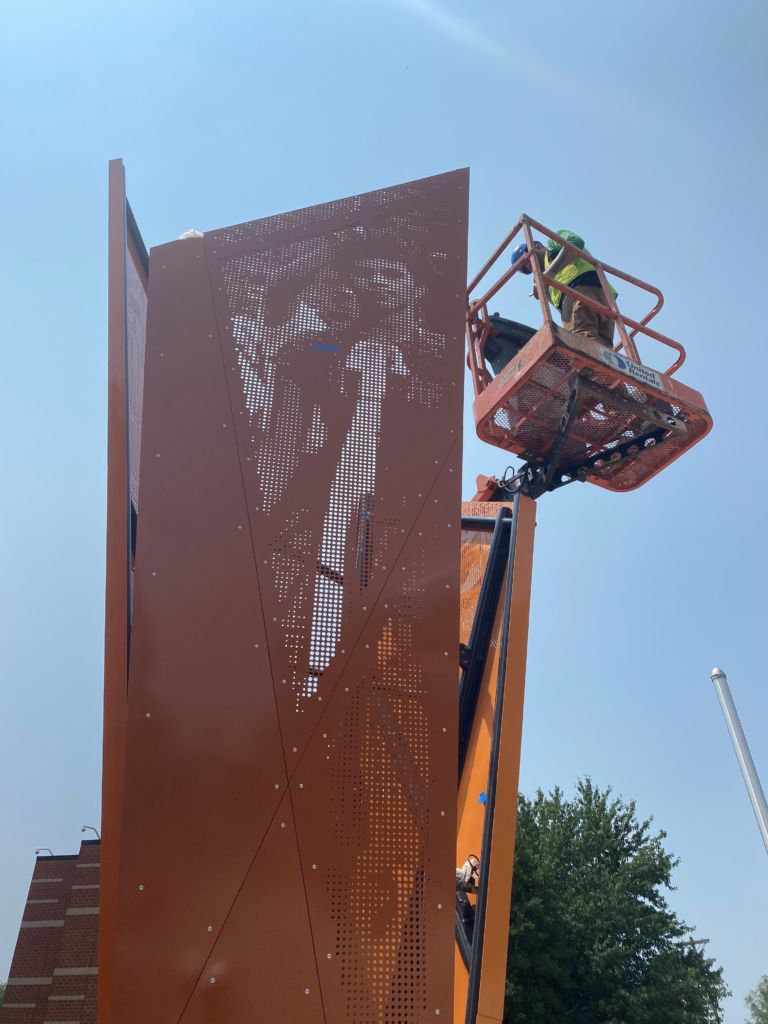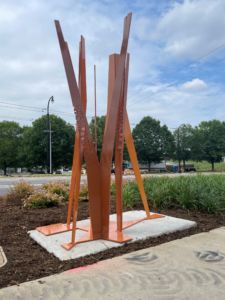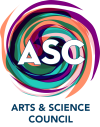Charlotte Artist Stacy Utley Creates Public Artworks for Charlotte’s Historic West End
“Excelsior” celebrates the strength and history of community.

CHARLOTTE, N.C. (July 29, 2021) – A new public art project led by Charlotte artist Stacy Utley and aided by Edwin Harris, co-founder and design principal of Durham-based architecture firm Evoke, now welcomes residents and visitors to Charlotte’s Historic West End.
Collectively known as “Excelsior,” the project is named after the historic Excelsior Club, a longtime center of Black social and political life in Charlotte. Individually, the artworks are titled “Ever Upward” and “Even Higher,” the Latin definitions of excelsior.

“Ever Upwards” is a cluster of folded laser-cut metal panels found at various points on West Trade Street on the southwest side of I-77. The four seven-foot abstract forms represent “‘the walk upward’ that Dorothy Counts made to integrate public schools in Charlotte, ‘the charge upward’ that every student that passes through the arch of Johnson C. Smith University (JCSU) takes, ‘the road upward’ that is Trade Street from ‘uptown’ to the highest point which is Biddle Hall and the ‘the prayers upward’ as we continue this journey,” Utley said in his artist statement.
“Ever Higher” is a sculpted piece consisting of three metal panels that include images significant to the Historic West End and the Five Points area. One panel features a reflective finish where the viewers can see themselves reflected in the artwork. Combined, its panels form a torch that is illuminated at night by LED spotlights.
The sculptural work is at the new Five Points Plaza, just west of uptown Charlotte at the convergence of Beatties Ford Road, Fifth, West Trade and State streets and the Rozzelles Ferry intersection. It includes images of Dorothy Counts Scoggins, who was one of the first Black students to integrate public schools in Mecklenburg County; signage from the Excelsior Club; and JCSU’s Biddle Hall.
“Inspired by the folding narratives of a quilt, the three panels ranging from 18 to 28 feet tall represent perseverance, inspiration and icon,” Utley said.
Utley and Harris met with and listened to residents and community stakeholders, including JCSU students, during the planning and design phases of the project. They incorporated the community’s feedback into the final design for the public artwork.
“The strength of ‘Excelsior’ is the manner in which it honors the history of the community in which it is sited while inspiring hope for its future,” said ASC Vice President of Public Art Todd Stewart. “Stacy and Edwin excel at creating landmarks that are rooted in place. The communities around Historic West End Charlotte have contributed greatly to our city for generations. ‘Excelsior’ celebrates that in a very inclusive way.”
Funding for the artwork is in accordance with the city of Charlotte’s Public Art Ordinance, which allocates one percent of the total construction budgets for eligible capital projects for public art. ASC manages the public art programs for the city and Mecklenburg County.
Other recent additions to the city of Charlotte’s public art collection include “Who Do You Say I Am?,” an aluminum sculpture featuring seven silhouettes representative of actual people who live and work in Charlotte-Mecklenburg and installed in May by Kansas City artist Beth Nybeck at the new CMPD University station; and “Reflective Terrain,” a sculptural work inscribed with performances and sport events hosted at Bojangles Coliseum and Ovens Auditorium and installed in September by Brooklyn artist Blane De St. Croix at the coliseum plaza.
ABOUT STACY UTLEY AND EDWIN HARRIS
Stacy Utley is an artist and educator whose work addresses complex narratives found within the African American diaspora. His works can be found in private and public collections at Johnson C. Smith University and North Carolina State University, among others.
Edwin Harris is principal and co-founder of Durham-based Evoke Studio. His portfolio of projects includes the National Center for Civil and Human Rights in Atlanta, Ga. and Emancipation Park in Houston, Texas.
ABOUT ASC
ASC is the chief advocate, resource hub and steward for the Charlotte-Mecklenburg region’s cultural community. Its core functions include advocacy, cultural education programs, cultural planning, fundraising, grant making, public art and workshops and trainings for the cultural community. ASC works to ensure Culture For All by combining resources from local and state government with those of the private sector to maximize community impact throughout the cultural sector.
ASC’s mission is to invest in the people, programs and ideas that move us toward a more equitable, sustainable and innovative creative ecosystem.
Stay up to date on ASC news and happenings at ArtsAndScience.org and on Facebook, Instagram and Twitter.
ASC is supported by Mecklenburg County, the Infusion Fund and its generous donors, N.C. Arts Council and individual and corporate donors to ASC.

